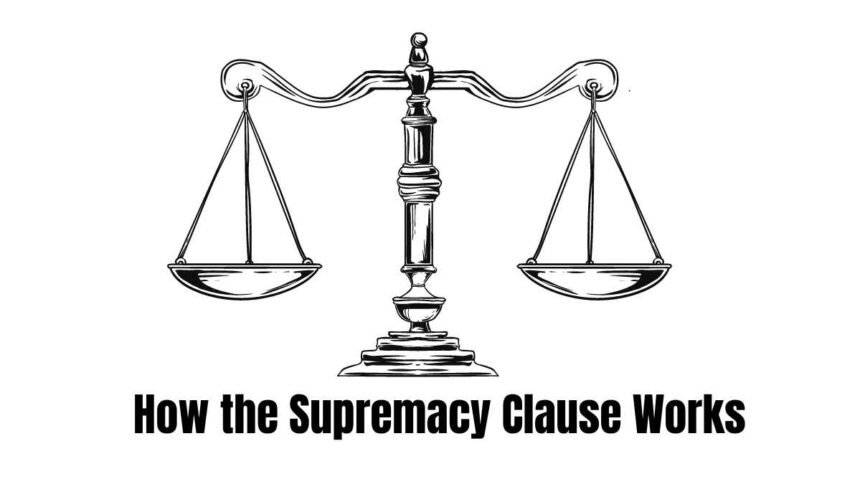The United States Constitution is the cornerstone of American government because it establishes the parameters within which the federal government can act.
The Supremacy Clause is one of the most important parts of the Constitution because it establishes uniform standards for resolving conflicts between federal and state legislation.
Understanding the historical background, legal ramifications, and the fine balance the Supremacy Clause maintains between federal and state authorities are all made clearer in this essay.
Historical Context and Genesis
The newly established United States faced a difficult challenge in the wake of the Revolutionary War: how to forge a unified national identity while protecting the independence of the many states.
The Founding Fathers responded to this difficulty by creating a constitutional framework for government that would find a balance between a robust federal government and the rights of individual states.
The Supremacy Clause of the Constitution (Article VI, Clause 2) became an important tool for striking this balance.
According to this provision, “This Constitution, and the Laws of the United States which shall be made in Pursuance thereof; and all Treaties made, or which shall be made, under the Authority of the United States, shall be the supreme Law of the Land…”
Hierarchy of Laws
The Supremacy Clause’s primary function is to establish a legal hierarchy, with federal statutes, treaties, and the Constitution itself given precedence over state statutes.
If there is a discrepancy between a federal law and a state statute, the former takes precedence.
Important exceptions to this principle exist, nonetheless, to keep the federal government and the states on equal footing.
Doctrine of Preemption
A natural outgrowth of the Supremacy Clause is the notion of preemption. It states that if Congress passes a federal law on a certain topic, any state laws on the same topic are null and void.
This idea helps keep things simple by mandating consistency wherever federal authority reigns.
However, it is up to the courts to decide whether or not the relevant federal statute preempts state law.
The Historic McCulloch v. Maryland Case
The famous 1819 Supreme Court case McCulloch v. Maryland established the Supremacy Clause’s modern applicability. The constitutionality of a Maryland levy on the federally chartered Second Bank of the United States was at issue here.
The majority opinion written by Chief Justice John Marshall demonstrated beyond a reasonable doubt that federal laws supersede state laws within the extent of federal jurisdiction.
With this decision, the federal government’s capacity to exercise implied powers was bolstered, and the power of the Supremacy Clause was reaffirmed.
Balancing Federal and State Authority
Although the Supremacy Clause reaffirms the primacy of federal law, it does not give the federal government carte blanche to violate state sovereignty.
In order to avoid upsetting the delicate balance, the federal government must restrict its actions to those within the scope of its specified authorities.
The Tenth Amendment furthers this equilibrium by retaining to the states those powers not expressly delegated to the federal government.
Because of this dynamic, individual states maintain some discretion and independence in areas not covered by federal law.
Interpretation and Challenges
There has been some debate regarding how to interpret the Supremacy Clause. There have been discussions throughout American history about the limits of federal power and the possibility of state rights being diminished.
The question of whether the federal government’s dominance should be limited to maintain state autonomy has arisen in talks about issues like civil rights, environmental laws, and the legalization of marijuana.
Modern Applications
The Supremacy Clause is still very important in shaping the current state of the law.
Federal preemption is a common occurrence in policies involving immigration, drugs, and telecommunications.
To decide whether federal statutes implicitly or explicitly preempt state laws, courts must carefully evaluate the intent of Congress in crafting those laws.
The Bottom Line
Foresight on the part of the Founding Fathers in striking a balance between a powerful central government and independent states is on full display in the Supremacy Clause.
Because of its pivotal role in resolving inconsistencies between federal and state laws, the American legal system can be relied upon to be consistent and stable.
The Supremacy Clause is a cornerstone of American governance, steering the country through complex legal terrain while sustaining the values of unity and federalism, despite obstacles and arguments over its interpretation.
Frequently Asked Questions (FAQ)
What is the Supremacy Clause?
The Supremacy Clause in Article VI, Clause 2 of the US Constitution states that federal laws, treaties, and the Constitution constitute supreme law. To minimize legal discrepancies, it prioritizes federal law above conflicting state legislation.
How does the Supremacy Clause impact state laws?
The Supremacy Clause states that federal law trumps state law. The idea of preemption ensures uniformity and consistency in federal sectors while maintaining state autonomy in other areas.
What is the significance of the McCulloch v. Maryland case?
The 1819 McCulloch v. Maryland case established the Supremacy Clause’s practicality. In this seminal case, the Supreme Court declared that federal laws within its power supersede state laws. Chief Justice John Marshall’s decision clarified federal-state law and implied powers.
How does the Supremacy Clause balance federal and state authority?
The Supremacy Clause balances federal and state authority by limiting the federal government to its Constitutional authorities. The Tenth Amendment protects this balance by giving states powers not granted to the federal government. This equilibrium protects state sovereignty against federal intrusion.
What are some modern applications of the Supremacy Clause?
Immigration, drug policy, and telecommunications regulation are still affected by the Supremacy Clause. If federal statutes tacitly or explicitly preempt state laws, courts must carefully assess their intent. This continual interpretation keeps federalism and state autonomy relevant in a rapidly changing legal world.



